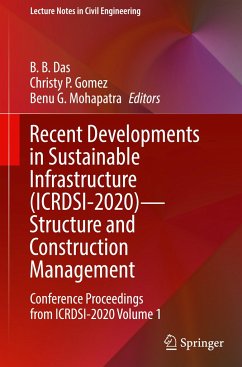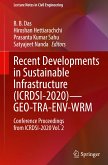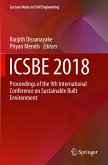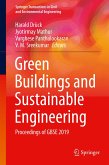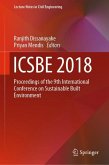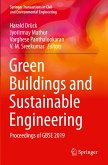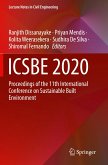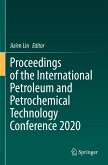Recent Developments in Sustainable Infrastructure (ICRDSI-2020)¿Structure and Construction Management
Conference Proceedings from ICRDSI-2020 Volume 1
Herausgegeben:Das, B. B.; Gomez, Christy P.; Mohapatra, Benu. G.
Recent Developments in Sustainable Infrastructure (ICRDSI-2020)¿Structure and Construction Management
Conference Proceedings from ICRDSI-2020 Volume 1
Herausgegeben:Das, B. B.; Gomez, Christy P.; Mohapatra, Benu. G.
- Gebundenes Buch
- Merkliste
- Auf die Merkliste
- Bewerten Bewerten
- Teilen
- Produkt teilen
- Produkterinnerung
- Produkterinnerung
This book includes selected papers from the International Conference on Recent Developments in Sustainable Infrastructure (ICRDSI-2020) and consists of themes pertaining to structural engineering and construction technology and management.
Andere Kunden interessierten sich auch für
![Recent Developments in Sustainable Infrastructure (ICRDSI-2020)¿GEO-TRA-ENV-WRM Recent Developments in Sustainable Infrastructure (ICRDSI-2020)¿GEO-TRA-ENV-WRM]() Recent Developments in Sustainable Infrastructure (ICRDSI-2020)¿GEO-TRA-ENV-WRM220,99 €
Recent Developments in Sustainable Infrastructure (ICRDSI-2020)¿GEO-TRA-ENV-WRM220,99 €![ICSBE 2018 ICSBE 2018]() ICSBE 201881,99 €
ICSBE 201881,99 €![Green Buildings and Sustainable Engineering Green Buildings and Sustainable Engineering]() Green Buildings and Sustainable Engineering147,99 €
Green Buildings and Sustainable Engineering147,99 €![ICSBE 2018 ICSBE 2018]() ICSBE 2018111,99 €
ICSBE 2018111,99 €![Green Buildings and Sustainable Engineering Green Buildings and Sustainable Engineering]() Green Buildings and Sustainable Engineering147,99 €
Green Buildings and Sustainable Engineering147,99 €![ICSBE 2020 ICSBE 2020]() ICSBE 2020121,99 €
ICSBE 2020121,99 €![Proceedings of the International Petroleum and Petrochemical Technology Conference 2020 Proceedings of the International Petroleum and Petrochemical Technology Conference 2020]() Proceedings of the International Petroleum and Petrochemical Technology Conference 2020183,99 €
Proceedings of the International Petroleum and Petrochemical Technology Conference 2020183,99 €-
-
-
This book includes selected papers from the International Conference on Recent Developments in Sustainable Infrastructure (ICRDSI-2020) and consists of themes pertaining to structural engineering and construction technology and management.
Produktdetails
- Produktdetails
- Lecture Notes in Civil Engineering 221
- Verlag: Springer / Springer Nature Singapore / Springer, Berlin
- Artikelnr. des Verlages: 978-981-16-8432-6
- 1st ed. 2022
- Seitenzahl: 856
- Erscheinungstermin: 26. April 2022
- Englisch
- Abmessung: 241mm x 160mm x 51mm
- Gewicht: 1431g
- ISBN-13: 9789811684326
- ISBN-10: 9811684324
- Artikelnr.: 62862199
- Lecture Notes in Civil Engineering 221
- Verlag: Springer / Springer Nature Singapore / Springer, Berlin
- Artikelnr. des Verlages: 978-981-16-8432-6
- 1st ed. 2022
- Seitenzahl: 856
- Erscheinungstermin: 26. April 2022
- Englisch
- Abmessung: 241mm x 160mm x 51mm
- Gewicht: 1431g
- ISBN-13: 9789811684326
- ISBN-10: 9811684324
- Artikelnr.: 62862199
Dr. Bibhuti Bhusan Das is currently serving as Associate Professor at National Institute of Technology, Karnataka, Surathkal, India. His research interests include design and development of sustainable construction and building materials, microstructure and durability of concrete, construction planning, and practices. Dr. Das has handled a number of research projects sponsored from Department of Science and Technology (DST), Govt. of India; Royal Academy of Engineering (RAEng), UK; Kudremukh Iron Ore Company Limited (KIOCL); Mangalore Refinery and Petro Chemicals Limited (MRPL). The fund generation and research contributions have led to the development of Sustainable Construction and Building Materials Laboratory at NITK Surathkal, a specialized laboratory that practices the theme of sustainability. He has published over 100 papers in Journals and conferences, and has given several key-note presentations across the world. He has guided four doctoral students and more than sixty master's thesis. Currently, he has eight students who are doing their doctoral thesis and around fifteen students having their master's degree. He has been serving as a Post-Doctoral Research Associate from Centre for Innovative Materials Research (CIMR), Lawrence Technological University, Southfield, Michaigan, USA, and has obtained Doctorate of Philosophy from Indian Institute of Technology (IIT) Bombay, India. He has won a number of awards one of the prestigious being the Outstanding Reviewer Award from Construction and Building Materials Journal, Elsevier. He has edited number of books entitled Sustainable Construction and Building Materials-Select Proceedings of ICSCBM 2018, Recent Developments in Sustainable Infrastructure-Select Proceedings of ICRDSI 2019, Smart Technologies for Sustainable Development-Select Proceedings of SMTS 2019, Recent Trends in Civil Engineering Select Proceedings of TMSF 2019, and is serving as one of Guest Editor of the Indian Concrete Journal and ison the editorial panel of some of the reputed Construction Engineering and Material journals. Dr. Benu Gopal Mohapatra is currently working as Professor & Director in School of Civil Engineering, KIIT Deemed to be University, Bhubaneswar, since July 2010. He has obtained a Ph.D. in Geotechnical Engineering from Indian Institute of Technology Bombay in the year 2001. After Ph.D., he has around 10 years of professional experience in leading Design & Consultancy firms such as Atkins Global Ltd. London, the UK, Larsen & Toubro (ECC) - in Dubai & India, Delhi Underground Metro Corridor - MC1B and Fugro Geotech Ltd out of which he has served more than 6 years in overseas prior to the academic career. While in overseas, he successfully delivered several foundation/geotechnical solutions as Lead Designer for Crossrail London Rail Ltd, London Underground, Network Rail, UK, M50 Slope Widening Options, Ireland, etc. His major research focus is in the field of Geotechnical Engineering related to Pile Foundation, Ground improvement, Slope stability, and Soil structure interaction. He has introduced various industry-oriented elective subjects at undergraduate and postgraduate level in School of Civil Engineering to bridge the gap between industry and academia. Also he was instrumental in launching a postgraduate diploma program in Construction Management & Infrastructure Development program in School of Civil Engineering in 2017 in association with Simplex Infrastructures Ltd. He has published many research papers in international and national journals and also in conference proceedings. Presently, he is actively involved in many challenging consultancy projects in Odisha as well as outside Odisha and executed projects with advanced technologies specifically in Soil Nail Technique in Odisha state for National Highway, NBCC, ITDA etc. He is serving as member of Institute of Civil Engineers (UK), British Geotechnical Society (UK), and Fellow Member, Institution of Engineers & Indian Geotechnical Society. He is one of the Empanelled Resource Person of the prestigious "Indian Academy of Highway Engineers (IAHE)." He is one of the Editors of a book named "Circular Economy in Construction Industry" for CRC Press (Taylor & Francis). Dr. Christy P. Gomez is leading Researcher in the field of Construction Management. He is Mathematics Graduate from University of Malaya, and he additionally has a Civil Engineering with computing degree from the University of Surrey, UK. He was awarded the W.J. Peck Memorial Prize for outstanding endeavor by the University of Surrey in 1998 and was recommended to complete his Ph.D. program in Construction Management at the University of Birmingham. He served as Postgraduate Teaching Assistant at the University of Birmingham assisting on the undergraduate and postgraduate programs. He is qualified Midland Excellence Assessor for the British Quality Foundation, which he served for 2 years, from 1999-2000. He has worked on an Engineering and Physical Sciences Research Council (EPSRC) UK, research project for a period of 3 years from 1999-2001 (Proposal GR/M075640) on the "Culture of Quality of UK Construction Industry." In Malaysia, he has worked on research and development projects with CREAM (Research arm of Construction Industry Development Board, CIDB), SHR Civil and Structural Consultants, Automated Design Xpress Sdn. Bhd (ADEX) and Sri Datai Properties (Sarawak) Sdn. Bhd. He has served as CREAM Industrialized Building System Working Group (WG3) Member and CREAM Expert Panel for "Sustainable Construction Through Mechanization, Automation and Robotics." He has been a recipient of industry contract research, MOSTI and FRGS research grants in addition to industry contract and university-based research grants. His current research interests are in Lean Construction, Public Private Partnerships, Sustainable Urban Development, Innovative Systems Design for Minimizing Waste in theBuilding Industry, and Performance Improvement Methodologies for the Construction Industry. Being an avid interdisciplinary researcher, Dr. Gomez has supervised postgraduate students from varying backgrounds, including IT, Civil Engineering and Building Construction, Manufacturing, Real Estate, and Architecture. He is Professional Technologist and Member of the International Group of Lean Construction (IGLC) and Lean in the Public Sector (LIPS) as well as Committee Member of the Qualitative Research Association of Malaysia (QRAM). Assoc. Prof. Ts. Dr. Gomez has currently one patent on Sustainability and two patents pending and has successfully competed at R&D competitions locally and abroad. The most notable being the British Invention Show (BIS) in London in 2009 having won a Gold Medal for the Lean Com2 Toolkit and a Silver Medal for the Web-LQMF Quality Assessment Tool, and recently in 2017 won a prestigious national award for the invention titled: Thermally Efficient Sustainable Hybrid (TESH) Brick, which is in the process of patent filing. He is Author of over 60 refereed publications. Currently he is working on publishing 2 books: "Malaysian IBS Manufacturer's Business Strategy for a Sustainable IBS Industry" and "Value Maximization Strategy for Construction Projects." Previous academic book publications have been with Open University Malaya (OUM). He served as Deputy Director of Commercialization and Innovation at Universiti Tun Hussein Onn Malaysia from 20072010. In 2011, Dr. Gomez successfully completed a 5 month sabbatical with industry and Queensland University of Technology in Brisbane, Australia. He recently completed a major industry-focused research on the role of Architectural Technologist for Sustainable Development and another on Supply Chain Management in the Furniture Industry; currently Dr. Gomez is working on a research to develop a methodology for implementing Sustainable Transport-oriented Development (TOD). Additionally, a key research titled: "Strategy for Implementing Green Supply Chain Management in the Construction Industry" is being planned, based on having developed a conceptual model for this purpose. This conceptual model won an award at the IConBEE 2018 conference. Currently Dr. Gomez is attached to SHR Associates - a Civil, Structural, & Highway Consulting Engineers as Professional Technologist Consultant.
Chapter 1 - Prediction of Carbonation on Precast Concrete Exposed to Severe Environmental Conditions (T. Jena, K. C. Panda, C. R. Panda).- Chapter 2 - Effects of Ultra-fine Material on Workability, Particle Packing Density and Compressive Strength of Mortar (Vinay Mohan Agrawal, Dr. Purnanand Savoikar).- Chapter 3 - Compressive Strength Prediction of Aluminosilicate Precursors Based Geopolymers Through Artificial Neural Network (ANN) (Sourav Kumar Das, Sandeep Shrivastava).- Chapter 4 - Load-Settlement Behaviour of Stone Column with Varied Spacing (Jijo James, Sivapriya S.V.).- Chapter 5 - Study on Fracture Parameters of Basalt Fiber Reinforced Concrete Beam by using Finite Element Method (Shilpi Shukla, Meena Murmu, S.V. Deo).- Chapter 6 - Non-Linear Vibration of Functionally Graded CNT-Reinforced Composite Plate Subjected to Different Types of Non-uniform In-Plane Loading (Vishal Singh, Rajesh Kumar, B. G.Mohapatra, S. N. Patel).- Chapter 7 - Optimum Mix Design of Rice Husk Ash-Based Geopolymer Concrete Based on Workability, Setting Time, and Compressive Strength Cured in Ambient Temperature Condition (Mahapara Abbass, Gyanendra Singh).- Chapter 8 - Formulation of Prediction Models for Mechanical Properties of Steel Fibre Reinforced Concrete (Subasini Y, Nivetha B, Praveenkumar S ).- Chapter 9 - Modelling and Prediction of strength for Polypropylene Fiber Reinforced Concrete (Nivetha B, Subasini Y, Praveenkumar S).- Chapter 10 - The Use of Artificial Intelligence in High Strength Hybrid Fiber Self Compacting Sustainable Concrete-An Approach to Function Approximation of Flexural Strength (V Rajesh, Dr. B. Narendra Kumar, Vishal Singh).- Chapter 11 - Gradation of the Relative Significance of the Claims Obtained from Construction Industry (Pramodini Sahu, D.K. Bera, P.K. Parhi).- Chapter 12 - Improvement of Concrete Strength by Bacillus Cereus Bacterium (Shradha Jena, Bidyadhar Basa, Kishor Chandra Panda).- Chapter 13 - Effect of Mechanical and Chemical Activation of Fly Ash on the Properties of Fly Ash Bricks (Zulker Nain, Bibhu Prasad Nayak, Sudeep Kumar Patel).- Chapter 14 - Utilization of Air Cooled Ferrochrome Slag in Lime Additive Blended Cement Based Concrete (Prasanna Kumar Acharya, Sanjaya Kumar Patro).- Chapter 15 - Evaluation of Pre-Cast Prestressed Concrete System: For the Housing Projects (Nathnael Workeluel, Tribikram Mohanty).- Chapter 16 - A Life Cycle Analysis based Framework to Promote Circular Economy in the Building Sector (Smitha J.S., Albert Thomas).- Chapter 17 - Effective Criterion for Equipment Management in Construction Industry (Dolasankar Sahu, Prof. Mohibullah).- Chapter 18 - Development in Sustainable Infrastructure - Correlation of Concrete Core Data(Shrushti Faldessai, Dr. K. G. Guptha).- Chapter 19 - Moving Load Identification on the Bridge by Accelerometer Transducer (Aman Prakash, Dr. Ganesh Hegde).
Chapter 1 - Prediction of Carbonation on Precast Concrete Exposed to Severe Environmental Conditions (T. Jena, K. C. Panda, C. R. Panda).- Chapter 2 - Effects of Ultra-fine Material on Workability, Particle Packing Density and Compressive Strength of Mortar (Vinay Mohan Agrawal, Dr. Purnanand Savoikar).- Chapter 3 - Compressive Strength Prediction of Aluminosilicate Precursors Based Geopolymers Through Artificial Neural Network (ANN) (Sourav Kumar Das, Sandeep Shrivastava).- Chapter 4 - Load-Settlement Behaviour of Stone Column with Varied Spacing (Jijo James, Sivapriya S.V.).- Chapter 5 - Study on Fracture Parameters of Basalt Fiber Reinforced Concrete Beam by using Finite Element Method (Shilpi Shukla, Meena Murmu, S.V. Deo).- Chapter 6 - Non-Linear Vibration of Functionally Graded CNT-Reinforced Composite Plate Subjected to Different Types of Non-uniform In-Plane Loading (Vishal Singh, Rajesh Kumar, B. G.Mohapatra, S. N. Patel).- Chapter 7 - Optimum Mix Design of Rice Husk Ash-Based Geopolymer Concrete Based on Workability, Setting Time, and Compressive Strength Cured in Ambient Temperature Condition (Mahapara Abbass, Gyanendra Singh).- Chapter 8 - Formulation of Prediction Models for Mechanical Properties of Steel Fibre Reinforced Concrete (Subasini Y, Nivetha B, Praveenkumar S ).- Chapter 9 - Modelling and Prediction of strength for Polypropylene Fiber Reinforced Concrete (Nivetha B, Subasini Y, Praveenkumar S).- Chapter 10 - The Use of Artificial Intelligence in High Strength Hybrid Fiber Self Compacting Sustainable Concrete-An Approach to Function Approximation of Flexural Strength (V Rajesh, Dr. B. Narendra Kumar, Vishal Singh).- Chapter 11 - Gradation of the Relative Significance of the Claims Obtained from Construction Industry (Pramodini Sahu, D.K. Bera, P.K. Parhi).- Chapter 12 - Improvement of Concrete Strength by Bacillus Cereus Bacterium (Shradha Jena, Bidyadhar Basa, Kishor Chandra Panda).- Chapter 13 - Effect of Mechanical and Chemical Activation of Fly Ash on the Properties of Fly Ash Bricks (Zulker Nain, Bibhu Prasad Nayak, Sudeep Kumar Patel).- Chapter 14 - Utilization of Air Cooled Ferrochrome Slag in Lime Additive Blended Cement Based Concrete (Prasanna Kumar Acharya, Sanjaya Kumar Patro).- Chapter 15 - Evaluation of Pre-Cast Prestressed Concrete System: For the Housing Projects (Nathnael Workeluel, Tribikram Mohanty).- Chapter 16 - A Life Cycle Analysis based Framework to Promote Circular Economy in the Building Sector (Smitha J.S., Albert Thomas).- Chapter 17 - Effective Criterion for Equipment Management in Construction Industry (Dolasankar Sahu, Prof. Mohibullah).- Chapter 18 - Development in Sustainable Infrastructure – Correlation of Concrete Core Data(Shrushti Faldessai, Dr. K. G. Guptha).- Chapter 19 - Moving Load Identification on the Bridge by Accelerometer Transducer (Aman Prakash, Dr. Ganesh Hegde).
Chapter 1 - Prediction of Carbonation on Precast Concrete Exposed to Severe Environmental Conditions (T. Jena, K. C. Panda, C. R. Panda).- Chapter 2 - Effects of Ultra-fine Material on Workability, Particle Packing Density and Compressive Strength of Mortar (Vinay Mohan Agrawal, Dr. Purnanand Savoikar).- Chapter 3 - Compressive Strength Prediction of Aluminosilicate Precursors Based Geopolymers Through Artificial Neural Network (ANN) (Sourav Kumar Das, Sandeep Shrivastava).- Chapter 4 - Load-Settlement Behaviour of Stone Column with Varied Spacing (Jijo James, Sivapriya S.V.).- Chapter 5 - Study on Fracture Parameters of Basalt Fiber Reinforced Concrete Beam by using Finite Element Method (Shilpi Shukla, Meena Murmu, S.V. Deo).- Chapter 6 - Non-Linear Vibration of Functionally Graded CNT-Reinforced Composite Plate Subjected to Different Types of Non-uniform In-Plane Loading (Vishal Singh, Rajesh Kumar, B. G.Mohapatra, S. N. Patel).- Chapter 7 - Optimum Mix Design of Rice Husk Ash-Based Geopolymer Concrete Based on Workability, Setting Time, and Compressive Strength Cured in Ambient Temperature Condition (Mahapara Abbass, Gyanendra Singh).- Chapter 8 - Formulation of Prediction Models for Mechanical Properties of Steel Fibre Reinforced Concrete (Subasini Y, Nivetha B, Praveenkumar S ).- Chapter 9 - Modelling and Prediction of strength for Polypropylene Fiber Reinforced Concrete (Nivetha B, Subasini Y, Praveenkumar S).- Chapter 10 - The Use of Artificial Intelligence in High Strength Hybrid Fiber Self Compacting Sustainable Concrete-An Approach to Function Approximation of Flexural Strength (V Rajesh, Dr. B. Narendra Kumar, Vishal Singh).- Chapter 11 - Gradation of the Relative Significance of the Claims Obtained from Construction Industry (Pramodini Sahu, D.K. Bera, P.K. Parhi).- Chapter 12 - Improvement of Concrete Strength by Bacillus Cereus Bacterium (Shradha Jena, Bidyadhar Basa, Kishor Chandra Panda).- Chapter 13 - Effect of Mechanical and Chemical Activation of Fly Ash on the Properties of Fly Ash Bricks (Zulker Nain, Bibhu Prasad Nayak, Sudeep Kumar Patel).- Chapter 14 - Utilization of Air Cooled Ferrochrome Slag in Lime Additive Blended Cement Based Concrete (Prasanna Kumar Acharya, Sanjaya Kumar Patro).- Chapter 15 - Evaluation of Pre-Cast Prestressed Concrete System: For the Housing Projects (Nathnael Workeluel, Tribikram Mohanty).- Chapter 16 - A Life Cycle Analysis based Framework to Promote Circular Economy in the Building Sector (Smitha J.S., Albert Thomas).- Chapter 17 - Effective Criterion for Equipment Management in Construction Industry (Dolasankar Sahu, Prof. Mohibullah).- Chapter 18 - Development in Sustainable Infrastructure - Correlation of Concrete Core Data(Shrushti Faldessai, Dr. K. G. Guptha).- Chapter 19 - Moving Load Identification on the Bridge by Accelerometer Transducer (Aman Prakash, Dr. Ganesh Hegde).
Chapter 1 - Prediction of Carbonation on Precast Concrete Exposed to Severe Environmental Conditions (T. Jena, K. C. Panda, C. R. Panda).- Chapter 2 - Effects of Ultra-fine Material on Workability, Particle Packing Density and Compressive Strength of Mortar (Vinay Mohan Agrawal, Dr. Purnanand Savoikar).- Chapter 3 - Compressive Strength Prediction of Aluminosilicate Precursors Based Geopolymers Through Artificial Neural Network (ANN) (Sourav Kumar Das, Sandeep Shrivastava).- Chapter 4 - Load-Settlement Behaviour of Stone Column with Varied Spacing (Jijo James, Sivapriya S.V.).- Chapter 5 - Study on Fracture Parameters of Basalt Fiber Reinforced Concrete Beam by using Finite Element Method (Shilpi Shukla, Meena Murmu, S.V. Deo).- Chapter 6 - Non-Linear Vibration of Functionally Graded CNT-Reinforced Composite Plate Subjected to Different Types of Non-uniform In-Plane Loading (Vishal Singh, Rajesh Kumar, B. G.Mohapatra, S. N. Patel).- Chapter 7 - Optimum Mix Design of Rice Husk Ash-Based Geopolymer Concrete Based on Workability, Setting Time, and Compressive Strength Cured in Ambient Temperature Condition (Mahapara Abbass, Gyanendra Singh).- Chapter 8 - Formulation of Prediction Models for Mechanical Properties of Steel Fibre Reinforced Concrete (Subasini Y, Nivetha B, Praveenkumar S ).- Chapter 9 - Modelling and Prediction of strength for Polypropylene Fiber Reinforced Concrete (Nivetha B, Subasini Y, Praveenkumar S).- Chapter 10 - The Use of Artificial Intelligence in High Strength Hybrid Fiber Self Compacting Sustainable Concrete-An Approach to Function Approximation of Flexural Strength (V Rajesh, Dr. B. Narendra Kumar, Vishal Singh).- Chapter 11 - Gradation of the Relative Significance of the Claims Obtained from Construction Industry (Pramodini Sahu, D.K. Bera, P.K. Parhi).- Chapter 12 - Improvement of Concrete Strength by Bacillus Cereus Bacterium (Shradha Jena, Bidyadhar Basa, Kishor Chandra Panda).- Chapter 13 - Effect of Mechanical and Chemical Activation of Fly Ash on the Properties of Fly Ash Bricks (Zulker Nain, Bibhu Prasad Nayak, Sudeep Kumar Patel).- Chapter 14 - Utilization of Air Cooled Ferrochrome Slag in Lime Additive Blended Cement Based Concrete (Prasanna Kumar Acharya, Sanjaya Kumar Patro).- Chapter 15 - Evaluation of Pre-Cast Prestressed Concrete System: For the Housing Projects (Nathnael Workeluel, Tribikram Mohanty).- Chapter 16 - A Life Cycle Analysis based Framework to Promote Circular Economy in the Building Sector (Smitha J.S., Albert Thomas).- Chapter 17 - Effective Criterion for Equipment Management in Construction Industry (Dolasankar Sahu, Prof. Mohibullah).- Chapter 18 - Development in Sustainable Infrastructure – Correlation of Concrete Core Data(Shrushti Faldessai, Dr. K. G. Guptha).- Chapter 19 - Moving Load Identification on the Bridge by Accelerometer Transducer (Aman Prakash, Dr. Ganesh Hegde).
